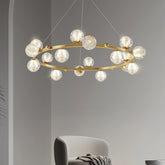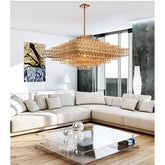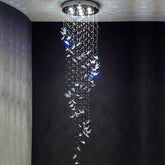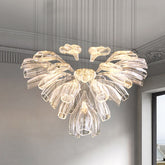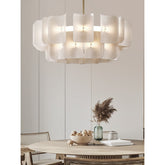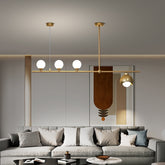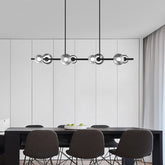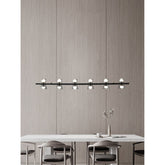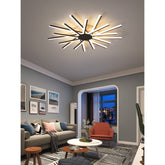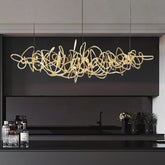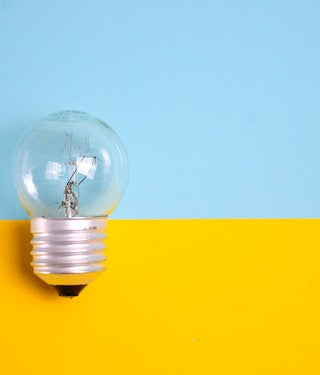A Beginner's Guide to Feng Shui in Home Decor
Feng Shui, an ancient Chinese practice, focuses on harmonizing individuals with their surrounding environment. Literally translating to "wind" and "water," Feng Shui emphasizes the flow of energy (or Chi) and its impact on health, wealth, and relationships. This practice has been used for thousands of years to optimize living spaces, ensuring that energy flows smoothly and supports those who inhabit them.
This guide aims to introduce beginners to the fundamental concepts of Feng Shui and provide practical tips for incorporating its principles into home decor. Whether you are looking to enhance the energy in your home, attract more positivity into your life, or simply create a more aesthetically pleasing environment, this guide will offer you step-by-step instructions and helpful insights to get started on your Feng Shui journey in your modern household.
Importance and Benefits of Incorporating Feng Shui in Home Decor
Incorporating Feng Shui into home decor can transform your living space into a sanctuary of balance and harmony. By aligning your environment with Feng Shui principles, you can:
- Enhance Well-being: Create a serene and calming atmosphere that promotes mental and physical health.
- Boost Prosperity: Arrange your home to attract positive energy that supports financial abundance and opportunities.
- Improve Relationships: Foster a loving and supportive environment that nurtures personal and familial bonds.
- Increase Productivity: Design workspaces that enhance focus and creativity, leading to greater efficiency and success.
- Promote Balance: Achieve a harmonious balance between the various elements in your home, contributing to a peaceful and joyful living experience.
Chi, the vital life force, is at the heart of Feng Shui. According to this practice, Chi flows through our surroundings and can be influenced by how we arrange our living spaces. Positive Chi, or Sheng Chi, brings vitality, prosperity, and health. In contrast, negative Chi, or Sha Chi, can lead to misfortune and imbalance.
The goal of Feng Shui is to cultivate Sheng Chi and minimize Sha Chi by carefully arranging furniture, choosing appropriate colors, and incorporating natural elements. By doing so, we can create an environment that supports our physical, emotional, and spiritual well-being. Whether it's positioning your bed for better sleep, placing plants to purify the air, or using colors to evoke specific emotions, understanding and manipulating the flow of Chi can transform your living space into a haven of harmony and positive energy.
Basic Principles of Feng Shui
The Five Elements: Wood, Fire, Earth, Metal, and Water
Significance of Each Element
-
Wood:
- Symbolizes growth, vitality, and expansion. It is associated with the spring season and the colors green and brown.
- Significance: Wood enhances creativity, growth, and motivation. It also promotes health and vitality.
-
Fire:
- Represents energy, passion, and transformation. It is linked to the summer season and the colors red, orange, and strong yellow.
- Significance: Fire brings warmth, enthusiasm, and strong energy into a space. It is essential for fostering passion and achieving goals.
-
Earth:
- Symbolizes stability, nourishment, and support. It is connected to late summer and the colors beige, yellow, and light brown.
- Significance: Earth elements provide grounding and stability, promoting a sense of security and balance.
-
Metal:
- Represents clarity, precision, and efficiency. It is associated with autumn and the colors white, gray, and metallic shades.
- Significance: Metal elements enhance focus, organization, and clear thinking. They are vital for productivity and structure.
-
Water:
- Symbolizes flow, wisdom, and tranquility. It is linked to winter and the colors blue and black.
- Significance: Water elements bring calmness, relaxation, and reflection. They are important for emotional well-being and fluidity in life.
How to Incorporate These Elements into Home Decor
-
Wood:
- Use wooden furniture, flooring, and decor items.
- Incorporate plants and greenery.
- Add artwork depicting trees or nature.
-
Fire:
- Use candles, fireplaces, and lighting fixtures.
- Incorporate red, orange, and strong yellow accents in cushions, rugs, and artwork.
- Display items made of natural materials like wool and leather.
-
Earth:
- Use ceramics, pottery, and stone materials.
- Incorporate earth-toned colors in walls, upholstery, and decor items.
- Add crystals and natural stones.
-
Metal:
- Use metal furniture, frames, and sculptures.
- Incorporate white, gray, and metallic colors in decor.
- Add reflective surfaces like mirrors and glass items.
-
Water:
- Use water features such as fountains or aquariums.
- Incorporate blue and black accents in textiles and decor.
- Add artwork depicting water scenes.
The Bagua Map
The Bagua Map is a fundamental tool in Feng Shui used to analyze and enhance the energy flow within a space. It divides a space into nine sections, each corresponding to different aspects of life:
- Wealth and Prosperity (Southeast)
- Fame and Reputation (South)
- Love and Relationships (Southwest)
- Family and Health (East)
- Center (Tai Chi) - overall balance
- Creativity and Children (West)
- Knowledge and Self-Cultivation (Northeast)
- Career (North)
- Helpful People and Travel (Northwest)
Each section is associated with specific colors, elements, and life aspects, guiding how to enhance these areas through decor and arrangement.
How to Use the Bagua Map in Home Decor
- Overlay the Bagua Map: Align the Bagua Map with your home’s floor plan, with the bottom of the map aligned with the wall containing your front door.
- Identify Areas: Determine which areas of your home correspond to each section of the Bagua Map.
-
Enhance Each Section:
- Wealth and Prosperity: Use the wood element and purple accents.
- Fame and Reputation: Incorporate the fire element and red colors.
- Love and Relationships: Use earth elements and pink or red accents.
- Family and Health: Enhance with wood elements and green colors.
- Center: Focus on balance and incorporate earth elements.
- Creativity and Children: Use metal elements and white or pastel colors.
- Knowledge and Self-Cultivation: Incorporate earth elements and blue colors.
- Career: Use the water element and black or dark blue colors.
- Helpful People and Travel: Enhance with metal elements and gray colors.
By applying the Bagua Map and incorporating the Five Elements into your home decor, you can create a balanced, harmonious living space.
Feng Shui Tips for Different Rooms
Living Room
Ideal Furniture Arrangement for Optimal Energy Flow
The living room is a social hub, and its arrangement should promote a smooth flow of energy. Position the seating area in a way that encourages conversation and allows everyone to see the entrance. Avoid placing furniture with its back to the door. Opt for a circular or semi-circular arrangement to foster connection and inclusivity. Ensure there is ample space to move around without obstruction.
Colors and Elements to Use
Incorporate colors that enhance the living room's energy based on the Bagua Map. Warm and welcoming colors like beige, light yellow, and earthy tones create a cozy atmosphere. Add elements of wood (furniture and plants) and metal (decorative items and frames) to balance the energy.
Importance of Natural Light and Air Circulation
Natural light is vital in Feng Shui, as it brings vibrant energy into the home. Maximize natural light by using sheer curtains and keeping windows clean. Air circulation is equally important; open windows regularly to let fresh air in and remove stagnant energy. Consider using fans or air purifiers to maintain a fresh and lively environment.
Bedroom
Bed Placement and Orientation
The bed should be placed in the "command position," where you can see the door without being directly in line with it. This placement promotes a sense of security and control. Avoid placing the bed under a window or directly opposite the door.
Creating a Peaceful and Restful Environment
A clutter-free, serene bedroom promotes restful sleep. Use soft, calming colors like blue, lavender, or neutral tones. Incorporate elements that evoke relaxation, such as soft lighting, comfortable bedding, and minimal electronics. Remove any items related to work or exercise to maintain a tranquil space.
Recommended Colors and Decor Items
Soothing colors like pastel shades, light blues, and greens are ideal. Decorate with natural materials like wood and cotton to enhance comfort. Use artwork and decor that evoke peace and positivity, such as images of nature or serene landscapes.
Kitchen
Importance of Cleanliness and Organization
The kitchen is the heart of the home and represents nourishment and prosperity. Keeping it clean and organized ensures a healthy flow of energy. Regularly declutter countertops, cabinets, and the fridge to prevent stagnant energy.
Proper Placement of the Stove, Sink, and Refrigerator
The stove represents the fire element, while the sink and refrigerator represent water. These elements should not be directly opposite each other to avoid conflict. Ideally, the stove should be positioned where the cook can see the entrance to the kitchen, promoting a sense of safety and control.
Using the Right Colors and Materials
Use colors that promote health and vitality, such as earthy tones, whites, and light greens. Incorporate natural materials like wood for cabinets and stone for countertops. Add vibrant touches with fresh fruits, vegetables, and herbs.
Bathroom
Keeping the Bathroom Door Closed
Bathrooms can drain energy due to the abundance of water. Keeping the door closed helps contain this energy. Additionally, ensure the toilet lid is always down when not in use to prevent energy loss.
Importance of Cleanliness and Maintenance
A clean and well-maintained bathroom promotes positive energy. Regularly clean all surfaces, keep clutter to a minimum, and fix any leaks or issues promptly to maintain a balanced environment.
Balancing Water Elements
Balance the water element with earth elements like stone or ceramic tiles. Use colors that evoke cleanliness and tranquility, such as whites, blues, and greens. Adding plants can help balance the excess water energy and introduce wood elements.
Home Office
Desk Placement and Orientation
The desk should be in the "command position," facing the door without being directly in line with it. This placement fosters a sense of authority and focus. Avoid having your back to the door, which can lead to a feeling of vulnerability.
Creating a Productive and Inspiring Environment
A clutter-free, organized office enhances productivity and creativity. Use storage solutions to keep work-related items tidy. Incorporate elements that inspire you, such as motivational artwork or personal achievements displayed on the walls.
Recommended Colors and Decor Elements
Opt for colors that stimulate focus and creativity, like greens, blues, and whites. Incorporate elements of wood (desks and shelves) and metal (lamp fixtures and decor) to balance the space. Add plants to introduce fresh energy and improve air quality.
Common Feng Shui Mistakes to Avoid
Clutter and Disorganization
Clutter is one of the biggest obstacles to positive energy flow in Feng Shui. It creates stagnation and blocks the smooth movement of Chi, leading to feelings of stress and overwhelm. Here are some tips to avoid clutter and disorganization:
- Regular Decluttering: Make it a habit to regularly declutter your home. Donate or discard items that you no longer need or use.
- Organized Storage: Use storage solutions like shelves, baskets, and bins to keep items organized and out of sight.
- Clean Surfaces: Keep surfaces like countertops, tables, and desks clear of unnecessary items. This not only improves energy flow but also creates a sense of calm and order.
Improper Placement of Furniture
The placement of furniture plays a crucial role in Feng Shui. Incorrect positioning can disrupt the flow of energy and create imbalance. Avoid these common mistakes:
- Blocking Pathways: Ensure that furniture does not obstruct pathways or doorways. Clear paths allow Chi to flow freely and make your home feel more open and inviting.
- Back to the Door: Avoid placing furniture, especially seating, with the back facing the door. This creates a sense of vulnerability and unease. Instead, position furniture so that you can see the entrance from where you sit.
- Against Walls: While placing furniture against walls can save space, it can also create stagnant energy. Allow some space between furniture and walls to promote better energy circulation.
Neglecting the Front Entrance
The front entrance, or the "mouth of Chi," is a vital area in Feng Shui. It is where energy enters your home, so keeping it welcoming and clear is essential. Here are some tips to avoid neglecting your front entrance:
- Clean and Tidy: Keep the entrance area clean and free of clutter. Sweep the steps, clean the doormat, and ensure the door is in good condition.
- Welcoming Decor: Use inviting decor like potted plants, a well-maintained garden, or a fresh coat of paint on the door to attract positive energy.
- Good Lighting: Ensure the entrance is well-lit. Good lighting not only makes the entrance more welcoming but also enhances the flow of Chi.
Easy Feng Shui Enhancements for Beginners
Using Plants to Improve Energy Flow
Plants are a simple yet powerful way to enhance the flow of positive energy (Chi) in your home. They represent growth, vitality, and nature, bringing life into any space. Here are some tips for using plants to improve energy flow:
- Choose Healthy Plants: Opt for vibrant, healthy plants with rounded leaves, as sharp or spiky plants can create negative energy.
- Place Strategically: Place plants in areas where you want to enhance energy flow, such as corners, near windows, and in rooms that feel stagnant or dull.
- Balance Elements: Use plants to balance the elements in your home, especially in areas dominated by metal or water elements.
Incorporating Mirrors Wisely
Mirrors are powerful Feng Shui tools that can amplify and redirect energy. However, they must be used carefully to avoid negative effects:
- Reflect Positive Energy: Place mirrors to reflect beautiful views, light, or artwork. This doubles the positive energy and spreads it throughout the space.
- Avoid Reflecting Negative Elements: Ensure mirrors do not reflect clutter, sharp edges, or anything that symbolizes negative energy.
- Use Proper Placement: Hang mirrors at an appropriate height so they do not cut off heads in reflections and position them to avoid reflecting doors directly, which can bounce energy out of the room.
Choosing the Right Colors for Different Rooms
Colors have a significant impact on the energy of a space. Selecting the right colors for each room can enhance specific energies and create a harmonious environment:
- Living Room: Use warm, welcoming colors like beige, soft yellows, and earthy tones to create a cozy atmosphere.
- Bedroom: Opt for calming colors such as light blues, greens, and neutral tones to promote restful sleep and relaxation.
- Kitchen: Use fresh, vibrant colors like light greens, whites, and yellows to stimulate appetite and energy.
- Bathroom: Choose clean, tranquil colors like whites, blues, and greens to promote cleanliness and relaxation.
- Home Office: Incorporate colors that enhance focus and productivity, such as greens, blues, and whites.
Start Small and Gradually Implement Feng Shui Principles
Starting with Feng Shui can feel overwhelming, but the key is to begin with small, manageable changes. Here are some tips to help you get started:
- Tackle One Room at a Time: Focus on one room or area, making small adjustments and observing the effects before moving on to the next.
- Make Simple Changes: Start with easy enhancements like decluttering, rearranging furniture, or adding a plant.
- Be Patient and Observant: Feng Shui is about creating a harmonious environment that feels right to you. Take your time to notice the changes in energy and how they impact your well-being.
Final Thoughts and Tips for Continuous Improvement
Incorporating Feng Shui into your home is an ongoing process of refinement and adjustment. Here are some final thoughts and tips for continuous improvement:
- Stay Open and Adaptable: Be willing to make changes and adjustments as you learn more about Feng Shui and how it affects your space.
- Regularly Update Your Space: Keep your home fresh and vibrant by regularly decluttering, updating decor, and introducing new elements that enhance energy flow.
- Listen to Your Intuition: Trust your instincts and feelings about what works best in your home. Feng Shui is as much about personal comfort and harmony as it is about following specific guidelines.
By starting with these easy enhancements and gradually implementing more Feng Shui principles, you can create a balanced, harmonious living space that supports your well-being and happiness.












































































































